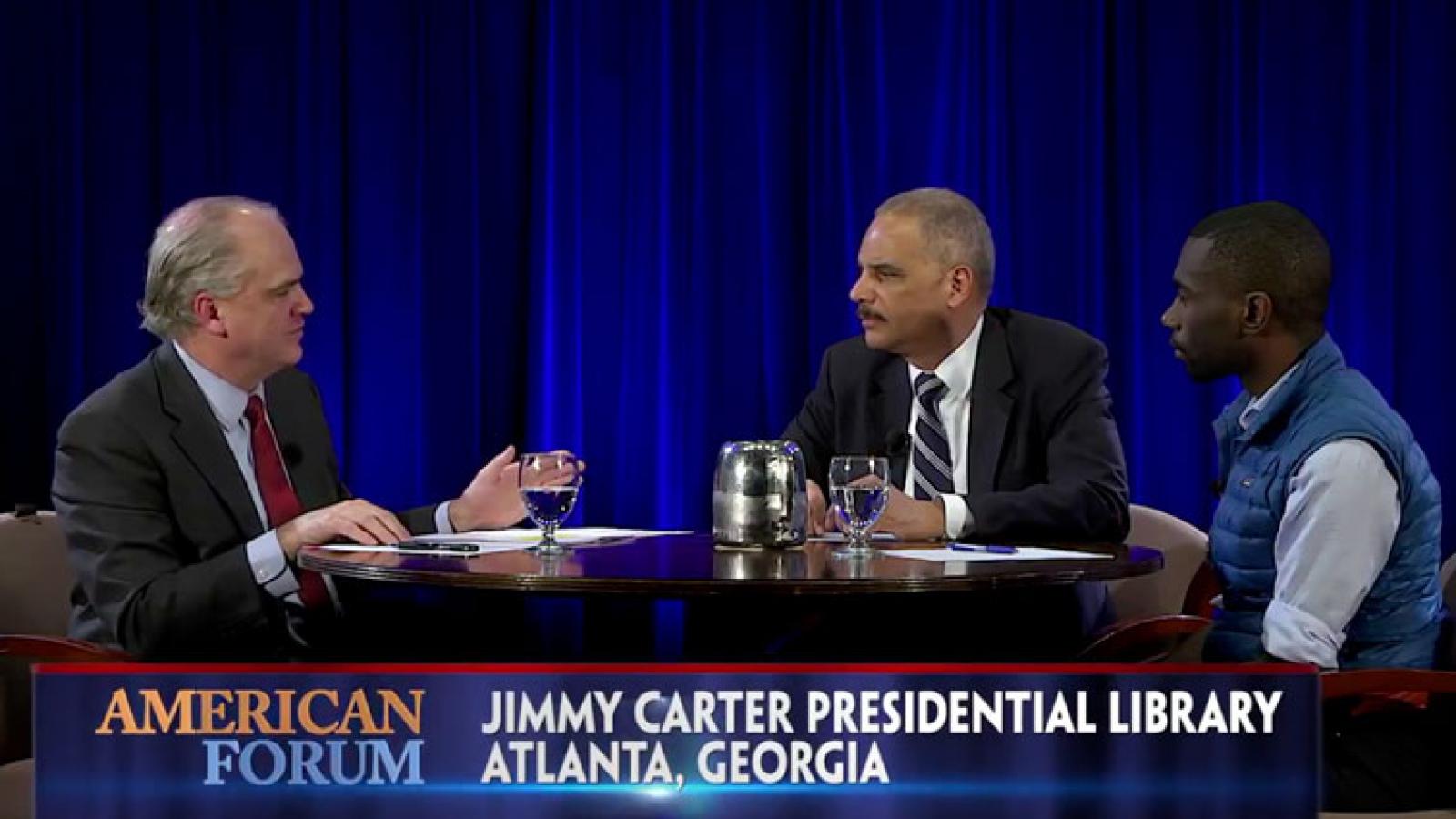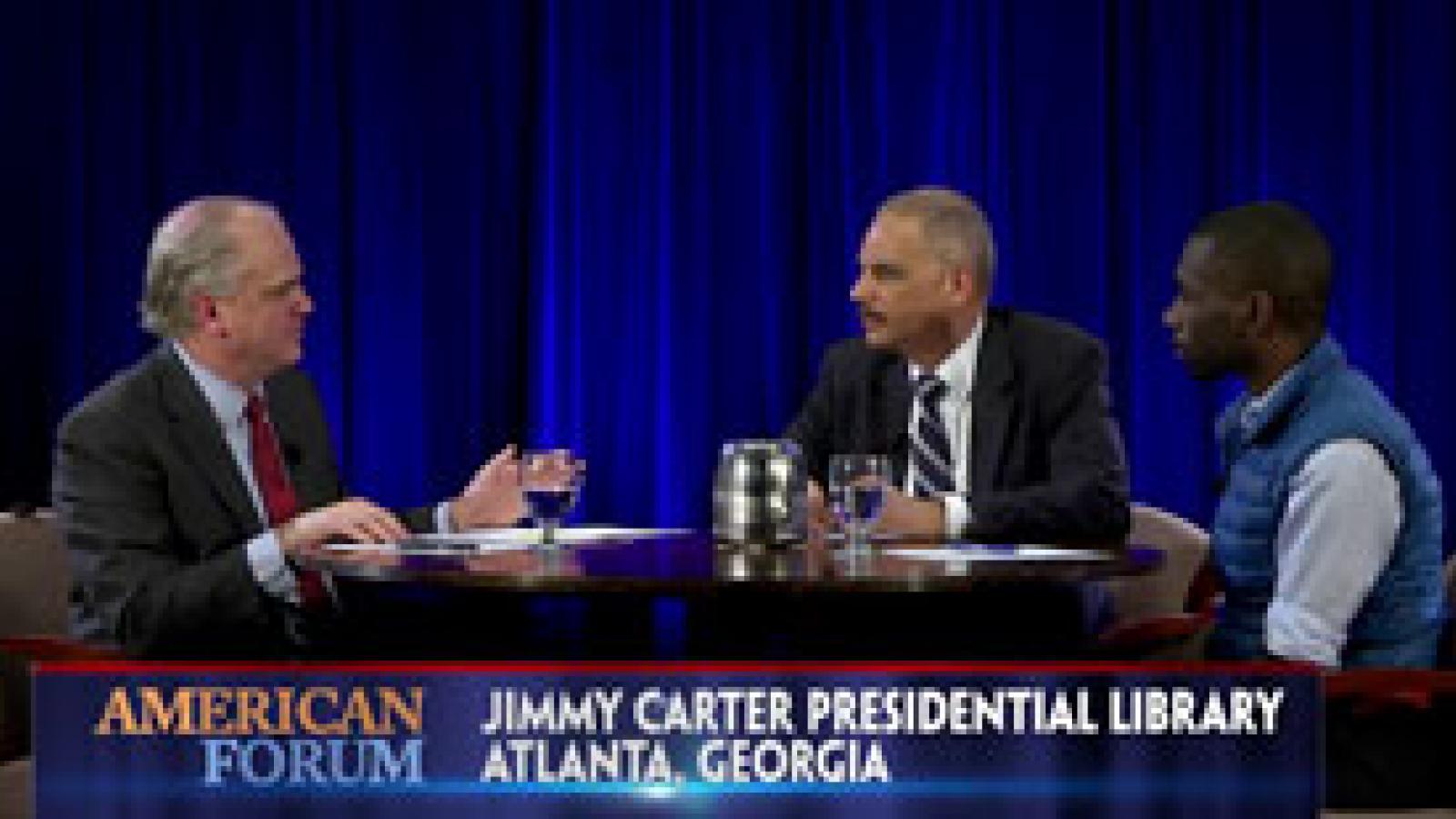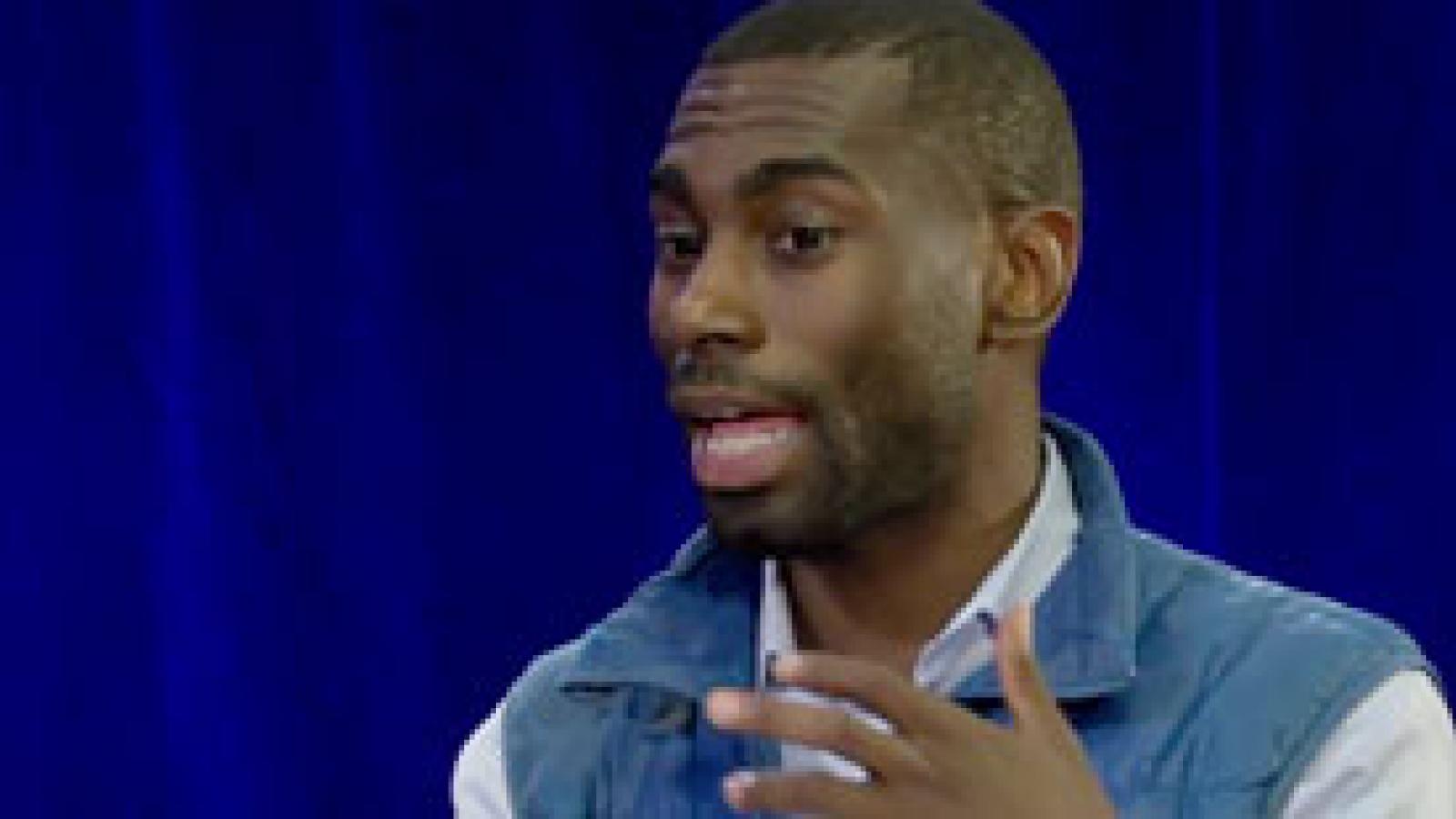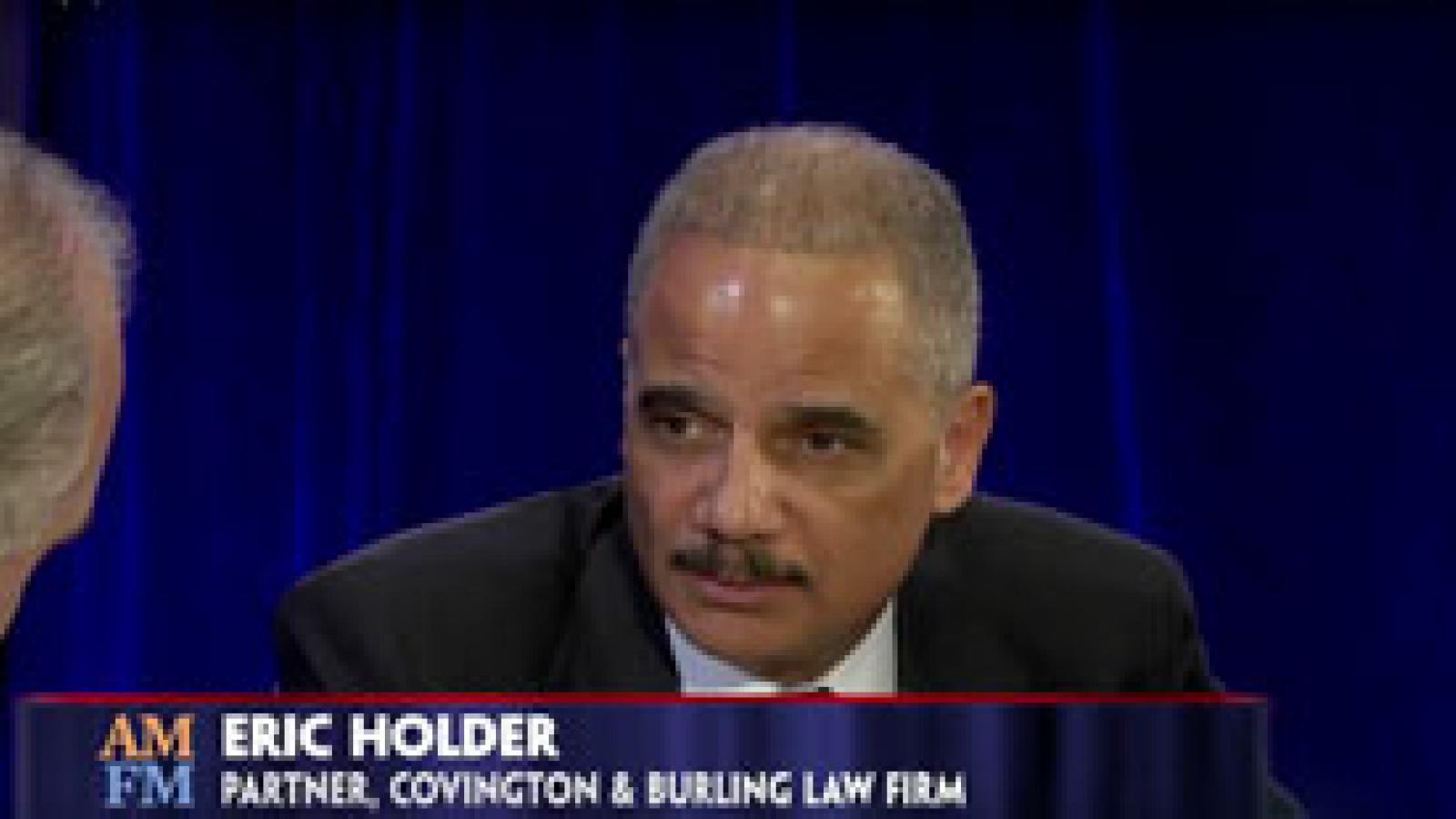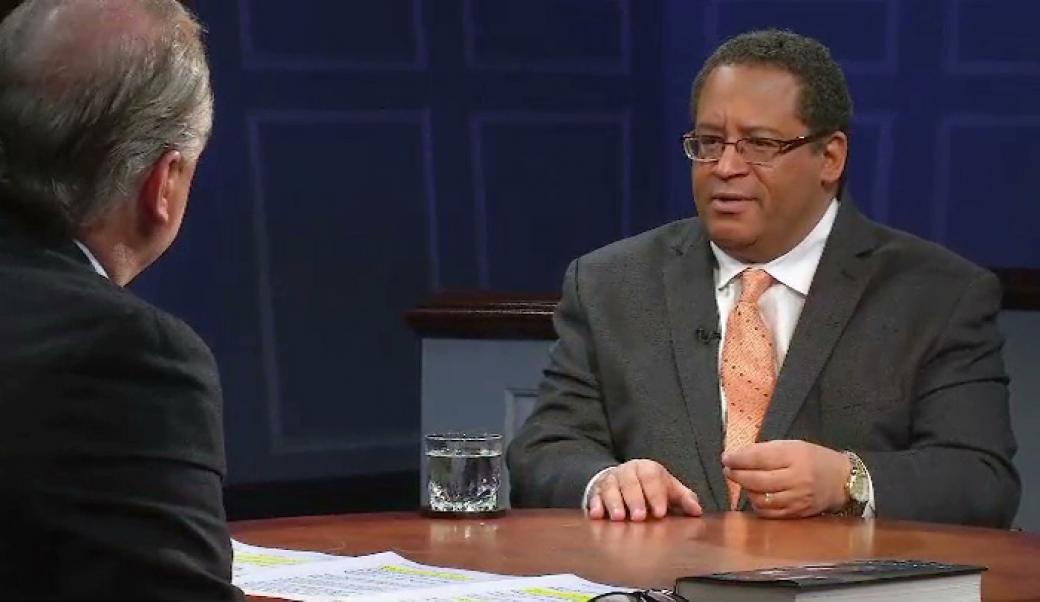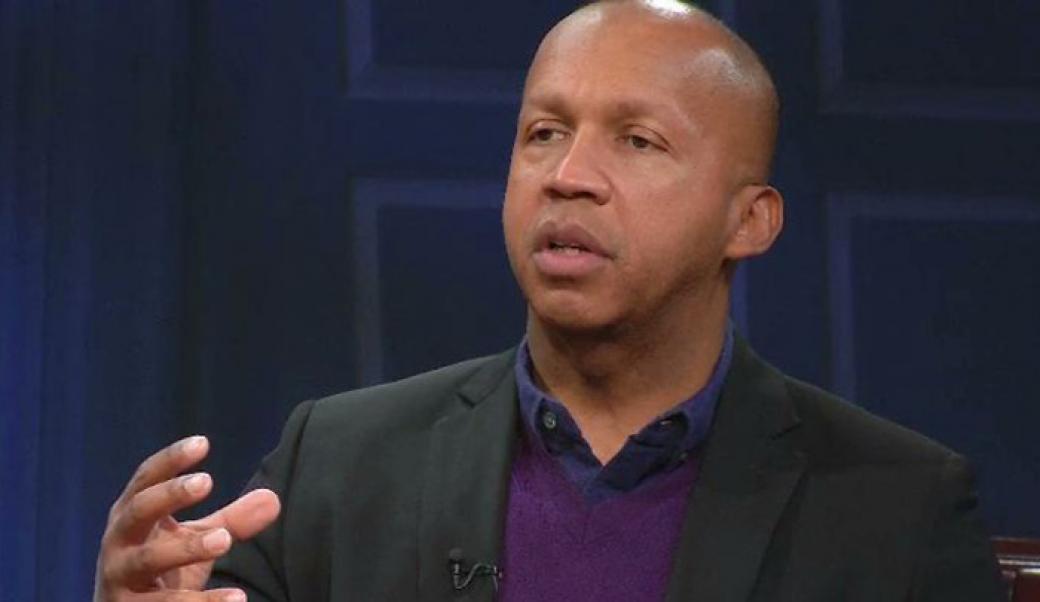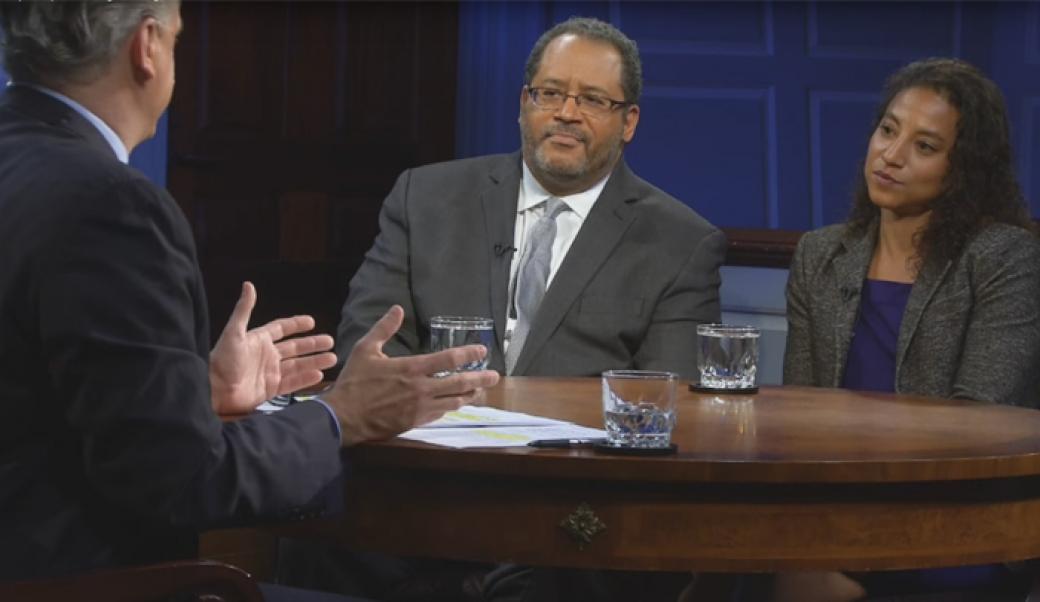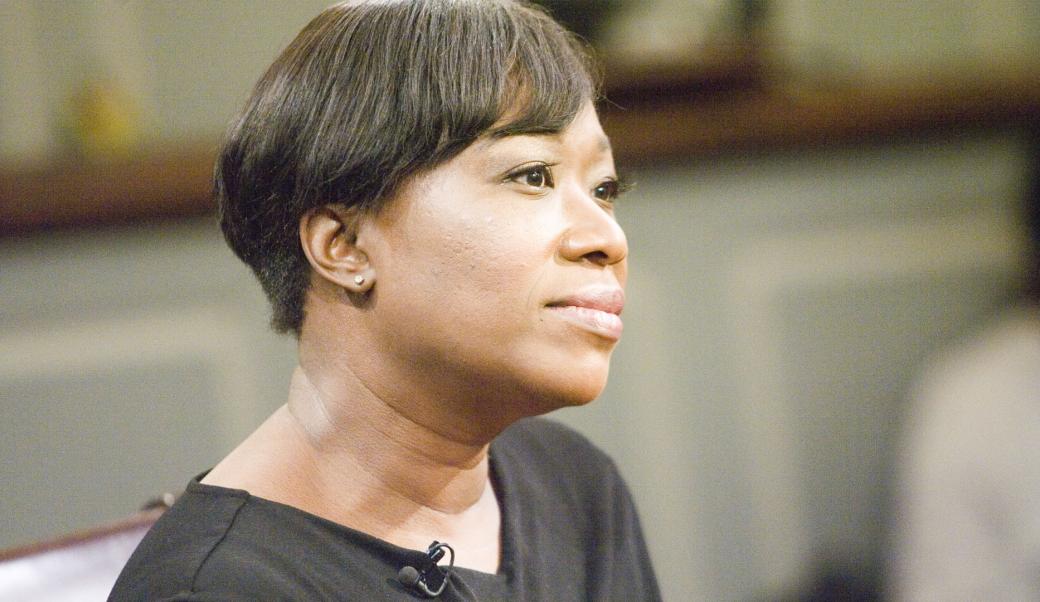About this episode
March 11, 2017
Eric Holder and Deray Mckesson
American Forum journeys to Atlanta to discuss the past, present, and future of race and the criminal justice system with former U.S. Attorney General Eric Holder and activist DeRay Mckesson at the Jimmy Carter Presidential Library. Are there new ways to think and talk about America's most vexing and longstanding challenge?
Race and Racism
First Year 2017: A new dialogue on race in America
Transcript
0:52 Douglas Blackmon: Welcome back to American Forum. I’m Doug Blackmon. We’re doing something different this week. As American Forum takes you on location to our day long National Summit on Race and the Presidency held recently at the Jimmy Carter Library in Atlanta, Georgia. It was an amazing event to see people from all across the political spectrum come together for frank, open discussions about the racial tensions that continue to plague our country, and the anxiety felt by so many Americans about whether our nation can continue moving forward. At the center of the discussion was Johnnie Mack, head of the Drum Major Institute—an organization founded by Dr. Martin Luther King Jr., now led by his son, Martin III, that has been in serious dialogue with the Trump White House on issues of race. Here’s a snippet from radio host Michael Eric Dyson and Harvard professor Elizabeth Hinton on a panel broadcast on Facebook Live that day.
(CLIPS INCLUDE DYSON AND HINTON)
Dyson: Whiteness is spoiled; it is often unconscious. It insists on its own innocence to reproduce its own power and it refuses to acknowledge its privilege..and it will not say it’s white. And so, what we have to do is encourage white brothers and sisters to see Donald Trump is the product, not the producer.
Hinton: It’s really a time for new discussions and a, and a turn away from this idea that pathology explains conditions in low income black communities. Its…those assumptions we see playing out in this language of dependency that really steered the elections. And Trump even saying during his inauguration speech… American carnage in Chicago, as if..as if crime and violence are somehow inate.
2:38 Blackmon: Later in the program we opened up the discussion to include dozens of other participants, including at one point, former acting Attorney General Sally Yates. (APPLAUSE) This was not a pep rally for any cause, candidate, or point of view. Instead it was a discussion about ways not to demonize those we disagree with. How to work together to find solutions in an incredibly difficult and divisive area. And to draw wisdom from the experiences of our nation’s past leaders. That’s what American Forum is all about. It was all a part of the Miller Center’s yearlong effort to gather experts and, in a nonpartisan way, search for solutions to the most vexing problems that are already facing President Trump in his first year in office. One of the best things about the summit we organized was that it began with a private meeting of national leaders on race, including former Attorney General Eric Holder, and Black Lives Matter leader DeRay McKesson, along with local activists in Atlanta, law enforcement personnel, political players, scholars, students and citizens to discuss how to jumpstart a constructive next chapter in our national dialogue on race. Others in the room represented the views of the Koch Brothers, who, perhaps surprisingly to some, have been strong advocates for criminal justice reform. So it was a conversation about how to have progress, even if it requires unorthodox alliances. So American Forum is on the road this week from that summit. And now we’ll bring you a dialogue at the end of that day, with two of the key participants from two different generations of leadership. Eric Holder was the first African American attorney general serving in the Obama administration from 2009 to 2015. Along with DeRay Mckesson a national leader in Black Lives Matter, who came to prominence following the police shootings in Ferguson, Missouri in 2014.
4:39 Blackmon: So, DeRay, we’re..we've come to the end of the first African American presidency. As an activist, someone who cares about this, what's your assessment of what happened in the Obama years?
DeRay Mckesson: Yes. I think about that election, it was monumental in so many ways, that the symbolism of his presidency is something that I think we'll continue to see the benefits of, and I think that any of us, we saw the organizing that happened around that election that we hadn't seen before, that scale. Like, we saw the house parties, the emails, like it was just so different, I think that's really important. I'm also mindful that the landscape of hope changed dramatically during his presidency, with the death of Trayvon and so many other things. The way people thought about the promise of America and definitely the promise of the presidency, I think changed, and people pushed for Obama to be stronger on race than I think he was in some ways. I will say, we met with him twice.
FACTOID: In 2013 Speech, Obama said U.S. was still not “a post-racial society”
I remember the last meeting we had, it was four hours, and there was a long, good four hours, but it was a long four hours, and in the end, he was like pushing the DOJ to think about, like how could funding be used as a lever. He was a thoughtful participant in those conversations. I'm not sure that actually ever translated into the public ways that he talked about either the protests or about race, and I think that that was in some ways disappointing. But when I think about the administration, the administration was, I think more aggressive at the end than they were during the beginning. So the work on mass incarceration, the work on definitely the police and the rhetoric around the police, was just so much tougher.
FACTOID: Obama commuted more prison sentences than any other president
I think that they had—if I had to bet, I think that they had planned to just punt it off, punt some things off to Hillary, if she was going to win, like they were going to set up the foundation with a taskforce, and Hillary was going to implement some of those things, and then that just didn't happen.
6:15 Blackmon: It is true, I think, correct me if I'm wrong, that there was a sense within the Obama White House, to stay away, to some degree, from the more complicated issues of race, certainly from the really complex criminal justice reform issues, to not deal so much for that in the first term, wait for the second term, because of the political volatility of it. Is that in fact how it played out or was there, as DeRay suggests, a sense that we'll get the ball rolling, but the next president is going to be a Democrat, will be a success and they'll carry it forward…is that a…?
Eric Holder: I wouldn't say that all was placed in the second term. We did significant things in the first term as well. I mean, among the things was to reverse the Ashcroft Doctrine, which essentially said that every prosecutor, when you had a case, you had to charge the maximum amount when you were faced with a particular fact situation.
FACTOID: John Ashcroft was George Bush’s attorney general from 2001-2005
I reversed that, that had an impact. We also began the work that I thought was necessary, for the "Smart on Crime" initiative that we announced in the second term, which was to research, you know do a lot of research, so we understood exactly what the nature of the issues were, what were the kinds of problems that we needed to deal with. And then we formed working groups within the Justice Department, that reported back to me with a series of proposals that I used in making the Smart on Crime announcement, I guess in front of the ABA in San Francisco. So it was part of a process.
7:40 Blackmon: One of the things we do at the Miller Center is research into the history of the presidency, and trying to find lessons for the president from things that happened in the past. You guys, earlier today, heard a clip of a recording of President Johnson.
President Lyndon Johnson and Democratic Party Chairman Francis Smith, 7/30/1964 [Text over audio]
President Johnson: Are you having an disturbances in Philadelphia?
Smith: We had a shooting yesterday of a young 16-year old boy by a policeman that was no good.
President Johnson: Uh, did uh, did…What-did the policeman just lose his head?
Smith: [sadly] Yeah. Quick.
President Johnson: Mmm.
Smith: quick with the revolver.
President Johnson: Kill him?
Smith: Yeah. Right through the chest. Right through the heart.
President Johnson: What was the boy doing?
Smith: Larceny, robbery. Sixteen-year-old, unarmed. It’s just a terrible thing.
President Johnson: Did he threaten him or anything?
Smith: No. He hollered to him to stop, and the boy ran and he fired. Killed him.
President Johnson: Mmm, mmm.
8:33 Blackmon: What's your reaction, DeRay, to hearing a tape like that, audio like that, from fifty years ago, that sounds a lot like what might have happened a week ago?
Mckesson: Yeah, I think what is real is that the rhetoric of progress has not matched the reality of progress in people's lives in so many ways, and I think that tape is a reflection of that. Also, it's a reminder that these issues around the conflict between police and communities has been around for a very long time, but what has changed in this moment is that people now have the tools to show people, in real time, things that are happening. So, Twitter, Facebook, Instagram, like those sort of things allow us to be our own storytellers, that you know, as people of color, we always face these issues of erasure, and erasure often manifests in two ways. One is either the story is never told or is told by everybody but us.
9:15 Blackmon: Let me ask you a sort of philosophical question, that—as a historian, I’ve, I’ve…I've argued for a long time and still would, I think it's a clinical observation, that any assessment of President Obama, his tenure has to view him as a successful president and a very historic president. I mean, he's historic just by virtue of having been the first African American president, but also the tremendous legislative achievements of the first term in particular. I mean, there's really no way not to view him as an empirically historic president. But having said that, there was so much hope that connected to his presidency, such an expectation of so much change, and then it turned out, whatever the exact measure is, that things were a lot more complicated than it seemed in January of 2009. You know, just it was a lot harder to tackle a lot of issues and that maybe there was an overconfidence in what one president could accomplish. If that's the case, does that tell us the inverse now, that if there's a lot of anxiety and worry about President Trump, maybe that's overstated, maybe that's as exaggerated as perhaps the hope was around President Obama, and if so, then maybe folks who are motivated around this issue shouldn't be quite as alarmed as they are. Does that make sense?
Holder: Yeah, I mean I think that's possible. It may be that you know, we see President Trump, at this time, as somebody who is not as capable as he might prove to be, or the people around him may not be as ideologically driven as they appear to me now to be, and it may be, it may be that by the end, the administration is more successful than we think now that it might be.
Mckesson: This has been the most exhausting beginning of a presidency, because every day you're like oh, I didn't even know the president could do that, that quickly. Part of that is that we haven't seen a president use their power, this sort of recklessly before, and Obama would never have been able to get away with wielding power like this, like the public pushback from the left itself, forget the right, would have been so enormous, and what we see right now is like a rubber stamp Congress, with the Republicans, that they are just letting him do this even in spite of the issues with Russia, with his family, with the business, all of the—no taxes, the confirmation hearings, and you're like is there a process? I think the standards have gone.
Holder: That's, I think something that will be interesting to see, what do Republicans do as this administration develops, especially as we get into an election year in 2018, when their names will be on the ballot, all of the members of the House, one-third of the Senate. What do Republicans, and in particular, what do moderate Republicans do with regard to their support of the Trump administration? I think that's something to watch in Washington, D.C.
Mckesson: And do you think, Attorney General Holder, you know, at the end of the administration there was such a public push to talk about local prosecutors and the importance of local prosecutors. Do you think that was the right push?
Holder: Yeah, I do. I think it's important, you know it's never either/or. I mean, I think too often we always think it's got to be one or the other, and I think in this case as in others, it's a question of both. Certainly, the Federal Government has to be focused on these criminal justice issues in a way that I think we were appropriately, but I think also, people need to focus, on a day-to-day basis, is making the assessments about how criminal justice policy is being carried out. There are about two million people in the United States who are incarcerated, and only about 200,000 of them or so, are in the federal system. The vast majority of people are in the state systems. Decisions about prosecutions are made by local prosecutors; DAs, assistant DAs, and focus needs to be paid on the kinds of decisions they're making, and then obviously, what the local police are doing.
FACTOID: State, federal governments fund 2,300+ prosecutors’ offices in U.S.
13:09 Blackmon: And one of the issues that any attorney general confronts and certainly you confronted, is as you were just describing, that so relatively few of the people incarcerated in the United States are in the federal system. So the direct power of a president to change anything that relates to incarceration is relatively limited, except by inspiration or by example. And so you guys could make fairly big changes in the federal prison system without it actually moving the needle a whole lot in terms of the whole…
Holder: Although to be fair, I mean there were states that had moved well before we announced the Smart on Crime initiative, who had done a variety of things in some red states as well.
Blackmon: Texas and Georgia.
Holder: Texas and Georgia, exactly right, where you would have thought, well that's not the kind of thing you would expect from a red state and yet they did these things and saw that they didn't spend as much as they had previously, on their criminal justice system, and didn't see any rise in the crime rate.
FACTOID: The Texas incarceration rate dropped by 10% between 2009 and 2014
FACTOID: Georgia spent $1.1 billion on inmates in 2010, twice the cost than in 1990
14:04 Blackmon: Does that suggest that there is a—that if we flipped this around, instead of, that over the last eight years, the hope and the expectation was that federal policy, Department of Justice policy, about reform in these areas, would ultimately chart a path for more and more reform by many states and localities? Does what you just said suggest that now that should be flipped around and the emphasis should be on red states like Texas and Georgia, that have pulled off big changes, with good benefits, in a political environment that maybe we would have thought wouldn't be possible? Are those the examples of what the rest of the country should be looking at and does that speak to some sort of possible working alliance between conservatives and liberals?
Holder: I think that possibility exists. I mean, I think a lot of what you saw in the states was budget driven, where you simply could not continue to do what you had—what had been done in the states, without busting state budgets. I think the possibility exists that, you know, to the extent I am concerned about losing the progress that we've made in criminal justice reform efforts, that it might be taken up by the states. The states might resist efforts that are placed on them, how ever done by the Federal Government. To resist those efforts and to continue to innovate, to try different kinds of things, to be reform minded, and reform minded in unexpected places.
15:32 Blackmon: What was your reaction, as a young American man, to on the one hand, sort of what I have to imagine was something of a whiplash sensation of, that there's the election of the first African American president, that seems to and I think at some level did, indicate a fairly astonishing degree of progress in American life, but then within a really short period of time, we're in an era that is maybe the most racially riven of, at least the last two or three decades, I think.
Mckesson: I think before, I had a less nuanced understanding of progress. I was like there's progress, right, and I was like not different water fountains any more, not segregated schools. I think that while we didn't have these big markers of progress, I think that I had been seduced by that in some ways, even though, you know both my parents are addicted to drugs. My father raised us. My mother left when I was three, so I grew up in a community of recovery and understood that part really well, but it wasn't until I went to Ferguson—and I taught, so I understood education disparities. But I went to Ferguson, I'll never forget, the second night that I was in St. Louis was the first night of the curfew, if any of you remember that, it was a midnight curfew, eight o'clock, we start getting tear-gassed.
FACTOID: Ferguson riots sparked by 2014 police shooting of Michael Brown
I remember getting tear-gassed for the first time and I was like this is not the America I thought I knew, right, that like I didn't do anything. The police killed Mike, we didn't do anything, we shouldn't have to protest, right? We shouldn't have to be outside. We're out here and we are like running from people with rifles and we didn't do anything, and it was in that moment that I was like something is wrong, like this is broken, and I was one of many people who said we'll put whatever we can on the line. When I think about protest, it is this idea of telling the truth in public, and we were using our bodies to tell the truth, that Mike should be alive. So that to me was like one of the life changing moments of dissidence, where it's just like this is wrong. I think what we saw all across the country is people stand up. I think that what we've seen since the Trump presidency is even more people come to the streets and say like something just isn't right here. I think the test will be can we turn it into power. I think that we have definitely shifted the conversation and I think that was hard work to do, but that was not the win. The win will be structural change.
Holder: And I'm not sure I initially agree with the notion that, that I think another thing that has kind of taken hold, that the Obama years were more racially riven, you know? I think the fact of his presidency. I think the fact of his presidency, the fact that an African American, a black man was president of the United States, pushed into the public sphere, a racial consciousness that perhaps we didn't have, or an interest in racial issues. Certainly, there were incidents, but I don't think that, you know in the years before, the country was much better racially than we were in the Obama years.
Mckesson: I would agree.
Holder: Perhaps were not as discussed. That didn't mean, on the other hand, that the abuses that, you know, put DeRay in the street, and others, were not occurring, or that we had made such great progress that somehow or other this progress had been reversed under the Obama years. I think there was a discussion, a focus, on things racial, that we had simply not done for an extended period of time, but I don't want people to think that things, I don't believe got racially worse during the Obama years. I simply don't believe that.
18:40 Blackmon: Has there been an escalation in the number of police killings of unarmed African American men, or has there simply been an escalation of cameras capturing these events?
Holder: I don't know. Getting back to what DeRay said earlier, we have not had a system that has kept numbers, so we don't have an ability to look at 2016 and say how did that compare to 1975. We can talk about incarceration rates, we can talk about numbers of people in prison, but for whatever reason we have not—and I'm calling on, you know, our government to start keeping these statistics.
Mckesson: Pizza Hut knows where your pizza is everywhere across the country, and we're collecting rainwater. We know rainwater and swamps in the—you know, like on treetops, in random places with no people, but we don't know the number of people the police kill, which is like a fascinating fact, right?
Holder: No, let's get it out there, let's talk about it, let's acquire the numbers of police shootings. Let's understand also, that some of these shootings are going to be justified and let's be prepared for that as well, but let's face, for the first time in our history, let's face, in a very honest way, a frank way, the racial issues that continue to divide us. We are really adept as a nation, and it's understandable, in kind of pushing to the side, putting back in the bottle, racial issues, that unless we talk about them, unless we're prepared to ask hard questions and face some painful truths, we're never going to make progress. We've got to do that; we have to do that.
FACTOID: Obama set up special task force on police practices after 2014 riots
There has to be this dialogue between people in law enforcement and the communities that they serve, that maybe serves as the foundation, but then I think there's some really concreate things that have to be done. A 21st century policing report that comes out of the Obama administration, I mean I think there are really concrete things. They actually did 21, 22 policy proposals, but I think in some ways it comes down to dealing with the question of implicit bias that affects black police officers as well as white policers, and then the question of use of force. How do you escalate so that your first response isn't to take out your gun and fire? We want to keep police officers safe, but I think with that dialogue and then with that kind of training, we could, I think pretty substantially reduce the number of negative interactions.
20:03 Blackmon: At the same time, let's also acknowledge that in the course of the campaign, not just on his election night speech, but when President Elect Trump said I want to be the president of all people, but there also were some other times, even when he was saying, giving these degrading descriptions of black neighborhoods after one of the shootings, police shootings that occurred during the campaign, and after someone showed him video of one of these sequences, he then publicly said well, when I saw that video, what I saw was a man doing all the things he's supposed to do, meaning followed the directions of the police officer and put his hands up, and then he got shot and killed. Trump was saying, and that didn't look right to me. So there are these glimmers of something else.
Mckesson: That's one glimmer. I don't know if there are glimmers.
21:50 Blackmon: So, by no means am I trying to make the case that President Trump is a new civil rights hero, he's got a lot of work to be that guy.
Holder: But it's obvious that there's going to be a test, that there is going to be an incident in which there's going to be something on tape, that some police officer is going to shoot a black man someplace, unfortunately I think this is likely to happen, and then the question will be, and it will depend on what the tape actually shows, then we'll know, we'll get a sense of what; this attorney general, what this president, what the Justice Department's reaction is going to be to, as we have seen in the past, the community unrest that is likely to be generated by the incident. And so we won't have to worry about glimmers, glimmer, or about theoretical kinds of things, the proof will be in the pudding.
22:41 Blackmon: And so let's say that that crisis comes, DeRay, what is it that you're expecting from President Trump, or what could President Trump do in that situation that would make you, at least for a moment, consider some reassessment of what his motivations really are?
Mckesson: A part of me thinks that they are hoping for an incident to happen, so that there can be something that is so wrong, that they use that paint everybody as like a bad person who should be in jail. That was one of my—that was one of the core pieces of nervousness around the march that happened after the inauguration, that I think his base is waiting for something, somebody to get hurt, or somebody to get shot during the—something to go so wrong, that they could use that to vilify all of us in a way that I think could be really damaging. I don't know, maybe Sessions comes out and like is this beacon of fairness or something. I don't think we've gotten any indication that that's going to be the case, and I am worried. Again, like if he's already said as much, that he doesn't believe in the Civil Rights Division, like he's not defended that office, and that is—in my mind, as an activist, that has been the DOJ's main lever with the police work. So in the absence of that, like I don't know what that looks like.
Blackmon: If there was one thing you were going to tell him, one thing that you need to think about President Trump, before this day of crisis comes, that you've just predicted, and just out of a sense of basic patriotism that none of us wants terrible things to happen to our country, and if you were going to give him one piece of advice to be ready for that day, what would that be?
Holder: I'd say think long-term, don't think about short-term political expediency, that history—you want to think about how history is going to view you in particular, how history is going to view your administration. Understand the history of these things and to, you know, to grow, maybe not go with that first instinct that you have, but to try to listen to people who are activists. Try to get other voices, listen to other people before you get out there and make that first pronouncement. Don't reflexively react to that which you see, don't react in a political way.
Blackmon: DeRay Mckesson, Eric Holder, thanks for being part of this conversation.
Mckesson: Good to be here.
Holder: Okay, thank you.
Blackmon: You’ve been watching American Forum on location this week at the Jimmy Carter Library in Atlanta. For more about our National Summit on Race and the Presidency go to the website for our first year Project, POTUS2017.org. to see other episodes of American Forum or read a transcript of today’s dialogue, visit us at millercenter.org. If you’d like to send me a comment, you can find me on Twitter. My handle is @douglasblackmon. Thanks for joining us. See you next week.
